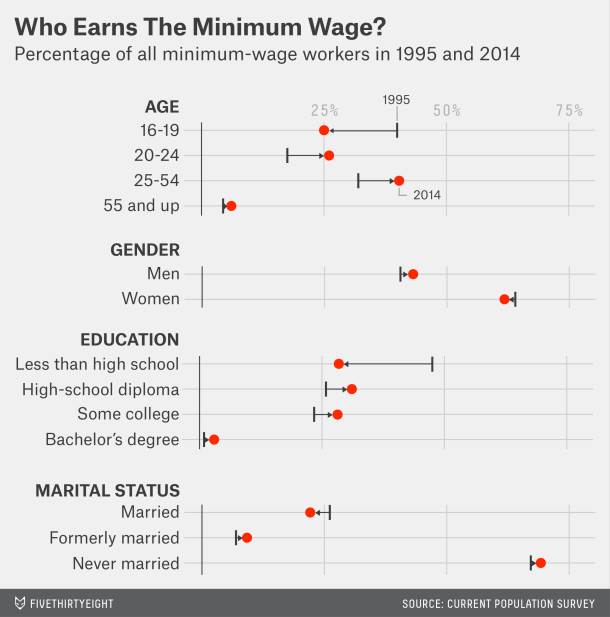Critics of the on-demand economy say the jobs aren’t good. The main reasons given are lack of security, lack of benefits and low pay. Steve King, a partner with Emergent Research and a regular contributor to SmallBusiness.com, says when he hears such complaints, his reaction is:
If you compare on-demand economy jobs to manufacturing sector union jobs from 30 years ago, I agree that on-demand economy jobs aren’t great. But jobs like that are quite rare these days.
Also, the majority of people working in the on-demand economy are part-time. This means the alternative to their on-demand economy work is, in most cases, a part-time or full-time low-wage or minimum-wage job. Or no job at all.
FiveThirtyEight.com does a nice job of describing minimum wage work:
The large number of people getting trapped in entry-level jobs is at least partly the fault of the overall economy. The share of workers staying in low-wage jobs at least a year rose during the 2008–09 recession and has improved only modestly since then. Other research has found that “job ladders” failed in the wake of the recession: Workers were forced into jobs they were overqualified for and then weren’t able to move up into better jobs the way they would during better economic times.
The article also points out that minimum wage job holders are older and better educated than in the past, as illustrated in this chart:

The hidden benefits of on-demand jobs
Most low-wage jobs—and especially those that are part-time—have few, if any, benefits. They also aren’t as secure and stable as in the past and many don’t even provide consistent hours.
So compared to these jobs, on-demand economy jobs start to look pretty good. Pay is certainly competitive with, and in many cases, better than, minimum wage jobs.
OK, they don’t cover Social Security payments, but on-demand economy jobs do provide work-flexibility and autonomy, which are highly valued by many.
Job satisfaction
Another point to consider is that studies (ours and others) consistently show on-demand economy workers are satisfied with their work and prefer it over a traditional job.
These people clearly see on-demand economy work as a better option than their alternatives.
I’m not saying we shouldn’t provide more security and protection for on-demand economy workers. There’s definitely a dark side to the gig economy and better worker protections need to be put in place.
I also agree we should be trying to figure out how to create more higher paying “good jobs” with full benefits and job security.
But today’s reality is that on-demand economy jobs are better than the alternatives for many.
Photo: ThinkStock
